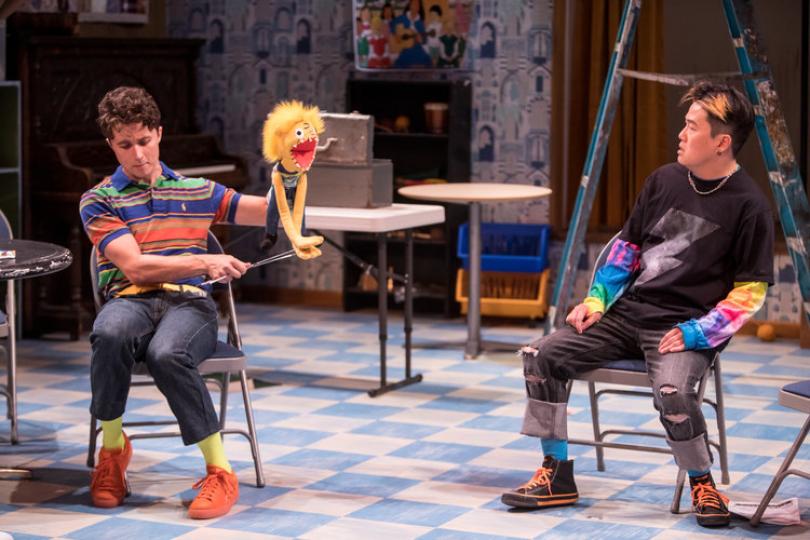Everyone could use a foul-mouthed puppet

When talking about Hand to God, you will most likely hear the obvious comparison to Avenue Q. And while the raunchy puppets are reminiscent of the sensational Sesame Street musical parody, the best scenes in Hand to God function in a different way. In Avenue Q, the actors and their puppets are one -- as an audience member you watch both the actor and her puppet and together they create the character. In Hand to God, the puppets are more libidinal; they function as manifestations of the id that take our protagonists on wild journeys.
The premise of Hand to God is simple enough: teenage Jason (Riley O’Toole) and Margery (Tracey Maloney) are trying to endure the unexpected loss of Jason’s father (Margery’s husband). Instead of facing their pain head-on or discussing some of the reasons he died, Jason and Margery soldier on as if nothing drastic has happened. To help them cope/bond, Margery starts a puppet club at their church. Rounding out the cast are Jason’s crush Jessica (C. Michael Menge), the near-delinquent Timothy (Eric Sharp), and the stock lecherous pastor, Pastor Greg (Kris Nelson).
O’Toole is phenomenal as both Jason (the teenage son) and Tyrone (Jason’s sinister puppet). His mannerisms, sad fanny pack, and hopeless stares will put you right back into the swirling vortex of adolescent emotions. When Tyrone suddenly comes to life, the play leaves it ambivalent whether this is just Timothy's unconscious way of dealing with trauma, or whether the puppet is actually the Devil. O'Toole's puppetry and ventriloquism with Tyrone are so excellent that I almost found myself forgetting that Tyrone was a puppet at all! C. Michael Menge is also delivers a stand-out performance--they breathe life into a slightly objectified role, nodding towards Jessica’s rich inner life that is demonstrably not the focus of the script.
Intensely Physical
One of the things I have been constantly enjoying about the Jungle’s season is how intensely physical it is -- remember The Wolves, where the girls stretched and kick balls around for 2 hours, and it was excellent? Hand to God embraces the scrappiness of its source material with our characters throwing nearly everything that isn’t tied down and playing exceedingly rough with one another. With such passion and verve, of course some of the scenes work better than others. Maloney and Sharp never feel quite comfortable together in their numerous encounter scenes, while O’Toole and Menge make bawdy puppet sex feel like an unquestionable extension of teenage angst.
The scene changes are so involved that they also feel like a deliberate attempt to inject physicality into the piece. On the one hand, it is great to see the Jungle stage so completely transformed by large and unwieldy sliding panels, which move pretty carelessly over the furniture in their way. On the other, it often takes them so much time to set up the different scenes that parts of the play lose their irreverent momentum to too much down time.
Problematic Depictions?
I think the problem with a play as good as Hand to God is that you can only say, “Go see it! It was really good!” so many times. This is one of the best things I have seen in the Twin Cities, and if you are able to snag a ticket, you should! But the flip side of it being so good is that small inconsistencies or elements of bad writing feel extra egregious in something so excellent. For me, there are two highly problematic elements of Hand to God that deserve a bit more thorough examination, and perhaps a bit of censure: the first is the subplot of Margery and Timothy’s tryst, and the second is the play’s attitude towards the church and persons of faith.
While Hand to God points towards Margery’s inner struggle, it doesn’t quite seem to earn her blameworthy conduct towards Timothy, a distraught minor under her care who she seduces/allows to seduce her. Their affair, played as it is for laughs in this production, belies how destructive and callous her behavior is. I feel that the spirit in which the Jungle showcased this relationship misses the mark somewhat. These scenes felt a bit too broad and would have been more powerful toned down. Such a rendering of these scenes would have allowed us more access to Margery as a person, not just as Jason’s mother, and would have helped us to understand how she could do such a horrible thing.
My second objection is to the script itself and its characterization and caricaturization of people of faith. The self-serving and horny pastor is so pat and uninteresting. It would have been so much better if some of the interactions between him and Margery were less emphatically creepy. The dawning realization that he is in love with or hitting subtly on her would have been much more believable and truthful than the brazen character we are faced with. Nelson and Maloney do a fantastic job with what they are given, but I would have loved to see a version of this play where both are more relatable. As with Margery’s indiscretions with Timothy, a more toned-down approach to the characters that are not Tyrone would have created a more distinct line between the adults and the adolescents.
My larger point is that these small quibbles about the script are the only bad thing I have to say about this play. Hand to God is a hilarious, charming, and more than slightly offensive gem. Go and see it immediately, recently extended at the Jungle Theater until August 19th.




